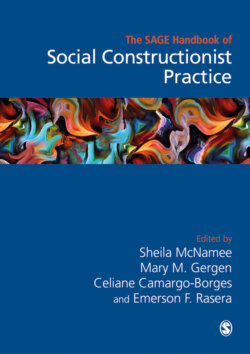Читать книгу The Sage Handbook of Social Constructionist Practice - Группа авторов - Страница 52
На сайте Литреса книга снята с продажи.
References
ОглавлениеAlvesson, M. and Sandberg, J. (2012). Has management studies lost its way? Ideas for more imaginative and innovative research. Journal of Management Studies, 50(1), 128–152. doi: 10.1111/j.1467-6486.2012.01070.
Audretsch, D. B., Lehman, E. E., and Link, A. N. (Eds.) (2019). A research agenda for entrepreneurship and innovation. Cheltenham, UK: Edward Elgar Publishing.
Banathy, B. H. (1996). Designing social systems in a changing world. New York and London: Plenum Press.
Bodiford, K. and Camargo-Borges, C. (2014). Bridging research and practice. Designing research in daily practice. The AI Practitioner Journal, 16(3), 4–8. ISBN 978-1-907549-20-5
Callon, M. (1987). Society in the making: The study of technology as a tool for sociological analysis. In T. Hughes and T. Pinch (Eds.), The social construction of technological systems: New directions in the sociology and history of technology (pp. 83–103). London: MIT Press.
Camargo-Borges, C. (2018a). Creativity and imagination: Research as world making! In P. Leavy (Ed.), Handbook of arts-based research (pp. 88–100). New York: Guilford Press.
Camargo-Borges, C. (2018b). Designing research with creativity: Arts-based methods as a way to co-create with Destinations. Tourism Destination Management Insights Journal, 11, 9–11.
Cooperrider, D. L. and Srivastva, S (1987). Appreciative inquiry in organizational life. In W. Pasmore and R. Woodman (Eds.), Research in organization change and development (vol. 1, pp. 129–169). Greenwich, CT: JAI Press.
Corning, P. A. (2012). The re-emergence of emergence, and the causal role of synergy in emergent evolution. Synthese, 185(2), 295–317.
Cross, N. (2006), Designerly ways of knowing. London: Springer-Verlag.
Gergen, K. (2014). From mirroring to world-making: Research as future forming. Journal for the Theory of Social Behavior, 45(3), 287–310.
Gergen, K. (2009). Relational being: Beyond self and community. Oxford: Oxford University Press.
Gergen, K. (1973). Social psychology as history. Journal of Personality and Social Psychology, 26, 309–320.
Gergen, K. Josselson, R., and Freeman, M. (2015). The promises of qualitative inquiry. American Psychologist, 70(1), 1–9.
Griebling, S., Vaughn, L., Howell, B., Ramstetter, C., and Dole, D. (2013). From passive to active voice: Using photography as a catalyst for social action [Special issue]. International Journal of Humanities and Social Science, 3(2), 16–28.
Hilary, P. (2000). Rethinking the research agenda. International Review of Research in Open and Distance Learning, 1(1). Retrieved from http://www.icaap.org/iuicode?149.1.1.1
Hjalager, A. M. (2010). A review of innovation research in tourism. Tourism Management, 31, 1–12.
Hosking, D.M. and McNamee, S. (2007). Back to basics: Appreciating appreciative inquiry as not ‘normal’ science. In J. Reed and L. Holmberg (Guest Eds.), The AIPractitioner (http://www.aipractitioner.com), November, 12–16.
Janowski, M. and Ingold, T. (2012). Imagining landscapes: Past, present and future. New York: Routledge.
Karakas, F. (2009). Welcome to world 2.0: The new digital ecosystem. Journal of Business Strategy, 30(4), 23–30.
Latour, B. and Woolgar, S. (1979). Laboratory life: The construction of scientific facts. Princeton: Princeton University Press.
Law, J. (2004). After method: Mess in social science research. London: Routledge.
Leavy, P. (2019). Personal communication, October 21, 2019.
Leavy, P. (2009). Method meets art: Arts-based research practice. New York: Guilford Press.
Lichtenstein, B. (2014). Generative emergence: A new science of organizational, entrepreneurial and social innovation. New York: Oxford University Press.
Mars, M. (2013). Framing the conceptual meaning and fundamental principles of innovation. In M. M. Mars and S. Hoskinson (Eds.), A cross-disciplinary primer on the meaning and principles of innovation (Advances in the Study of Entrepreneurship, Innovation and Economic Growth, Vol. 23) (pp. 1–12). Bingley, UK: Emerald Group Publishing Limited.
Mazzucato, M. (2018). Mission-oriented research and innovation in the European Union: A problem-solving approach to fuel innovation-led growth. Publications Office of the European Union, Luxembourg.
McNamee, S. (2010). Research as social construction: Transformative inquiry. Health & Social Change, 1(1), 9–19.
McNamee, S. (2004). Appreciative evaluation within a conflicted educational context. New Directions in Evaluation, 100, 23–40.
McNamee, S. (1988). Accepting research as social intervention: Implications of a systemic epistemology. Communication Quarterly, 36(1), 50–68.
McNamee, S. and Hosking, D. M. (2012). Research and social change: A relational constructionist approach. New York: Routledge.
Montuori, A. (2006). The quest for a new education: From oppositional identities to creative inquiry. Revision: A Journal of Consciousness and Transformation, 28, 4–20.
Nijs, D. (Ed.). (2019). Advanced Imagineering: Designing innovation as collective creation. Cheltenham, UK: Edward Elgar.
Nijs, D. and Terzieva, L. V. (2015). Rethinking research: How insights from complexity influence the way we research and develop knowledge and translate this in IMA Labs. World Futures: The Journal of New Paradigm Research, 71(1–2), 40–57.
Nowotny, H., Scott, P. B., and Gibbons, M. T. (2008). Re-thinking science: Knowledge and the public in an age of uncertainty. New York: Blackwell.
Parker, I. (2005) Qualitative psychology: Introducing radical research. Glasgow: Open University Press.
Ray, R. A. and Street, A. F. (2005). Ecomapping: An innovative research tool for nurses. Leading Global Nursing Research, 50(5), 545–552.
Senge, P., Hamilton, H., and Kania, J. (2015). The dawn of system leadership. Stanford Social Innovation Review. Leland Stanford Jr. University.
Smith, P. (2010). Just kids. New York: HarperCollins.
Stilgoe, J., Owen, R., and Macnaghten, P. (2013). Developing a framework for responsible innovation. Research Policy, 42(9), 1568–1580.
Wittgenstein, L. (1953). Philosophical investigations. Oxford: Basil Blackwell Ltd.
